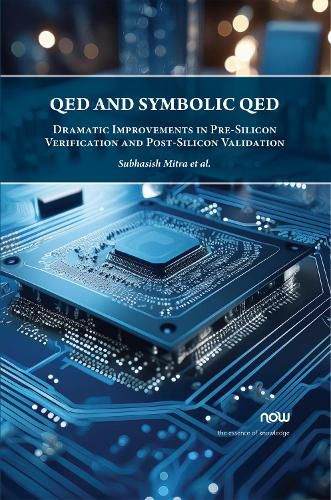Readings Newsletter
Become a Readings Member to make your shopping experience even easier.
Sign in or sign up for free!
You’re not far away from qualifying for FREE standard shipping within Australia
You’ve qualified for FREE standard shipping within Australia
The cart is loading…






This title is printed to order. This book may have been self-published. If so, we cannot guarantee the quality of the content. In the main most books will have gone through the editing process however some may not. We therefore suggest that you be aware of this before ordering this book. If in doubt check either the author or publisher’s details as we are unable to accept any returns unless they are faulty. Please contact us if you have any questions.
System-on-Chips (SoCs) are an integral part of our lives. The complexity of SoCs requires sophisticated tools and methods for ensuring functional correctness, especially in critical domains such as automotive and healthcare applications. In addition, the prevalence of security features in SoCs and emerging threats such as Spectre and Meltdown underscore the need for advanced verification techniques to combat security vulnerabilities. Existing verification approaches consume over 50% of development effort. Pre-silicon verification ensures functional correctness before chip fabrication, while post-silicon validation detects bugs that escape pre-silicon verification. Existing pre-silicon and post-silicon approaches are inadequate resulting in skyrocketing bug escapes and respins.
To address these challenges, this book presents pre-silicon verification and post-silicon validation methods based on Quick Error Detection (QED) principles: self-consistency checking to detect and localize design bugs. Symbolic QED combines QED principles with model checking (a formal verification technique) for pre-silicon verification. Many studies, including industrial case studies, have demonstrated the effectiveness and practicality of Symbolic QED. QED-based methods for post-silicon validation significantly reduce the error detection latency (the time elapsed between the occurrence of a bug and its manifestation as an observable failure) by several orders of magnitude, addressing the limitations of existing validation and debug approaches.
This book also discusses Unique Program Execution Checking (UPEC), a hardware security verification technique inspired by QED principles. Beyond the specific QED techniques described here, a new pre-silicon verification approach called G-QED (Generalized Quick Error Detection) is already demonstrating significant drastic benefits for pre-silicon verification of a wide variety of designs.
$9.00 standard shipping within Australia
FREE standard shipping within Australia for orders over $100.00
Express & International shipping calculated at checkout
This title is printed to order. This book may have been self-published. If so, we cannot guarantee the quality of the content. In the main most books will have gone through the editing process however some may not. We therefore suggest that you be aware of this before ordering this book. If in doubt check either the author or publisher’s details as we are unable to accept any returns unless they are faulty. Please contact us if you have any questions.
System-on-Chips (SoCs) are an integral part of our lives. The complexity of SoCs requires sophisticated tools and methods for ensuring functional correctness, especially in critical domains such as automotive and healthcare applications. In addition, the prevalence of security features in SoCs and emerging threats such as Spectre and Meltdown underscore the need for advanced verification techniques to combat security vulnerabilities. Existing verification approaches consume over 50% of development effort. Pre-silicon verification ensures functional correctness before chip fabrication, while post-silicon validation detects bugs that escape pre-silicon verification. Existing pre-silicon and post-silicon approaches are inadequate resulting in skyrocketing bug escapes and respins.
To address these challenges, this book presents pre-silicon verification and post-silicon validation methods based on Quick Error Detection (QED) principles: self-consistency checking to detect and localize design bugs. Symbolic QED combines QED principles with model checking (a formal verification technique) for pre-silicon verification. Many studies, including industrial case studies, have demonstrated the effectiveness and practicality of Symbolic QED. QED-based methods for post-silicon validation significantly reduce the error detection latency (the time elapsed between the occurrence of a bug and its manifestation as an observable failure) by several orders of magnitude, addressing the limitations of existing validation and debug approaches.
This book also discusses Unique Program Execution Checking (UPEC), a hardware security verification technique inspired by QED principles. Beyond the specific QED techniques described here, a new pre-silicon verification approach called G-QED (Generalized Quick Error Detection) is already demonstrating significant drastic benefits for pre-silicon verification of a wide variety of designs.